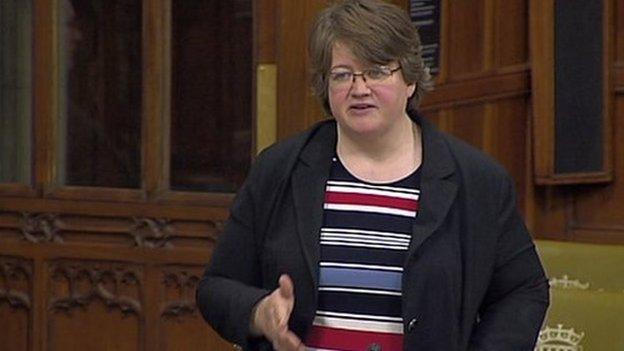The English question: the Delyn or Denbigh dilemma?
- Published
- comments

Deputy Commons Leader Therese Coffey
MPs have spent 90 minutes grappling with what is increasingly called the English question.
As the government prepares to unveil plans for "English votes for English laws", MPs have been debating what EVEL would mean for North Wales.
Ynys Mon MP Albert Owen led a debate in Westminster Hall. He argued that although the current devolution settlement may be messy, unbalanced, asymmetrical and need adjusting, with parliament creaking, EVEL is not the answer. (An English parliament and federalism would be his preferred solution).
Former Welsh Secretary David Jones thought the future Wales bill offered a chance to re-shape the settlement: "The problem is that the devolution settlement imposed in 1999 is frankly not fit for purpose. It does not work; it is a lash-up and it needs to be revisited."
Aberconwy MP Guto Bebb supported the government's plans: "We need to ensure that laws that relate only to England can be influenced by Members from Wales, Scotland and Northern Ireland, but the main decision-making on those specific laws that are deemed English-only should be made by English MPs."
He thought it was possible to decide clearly what is - and isn't - an English law (it will be left to the speaker of the House of Commons to decide). Several Labour MPs disagreed. Would an English health bill be an England-law even if people from Wales use the English NHS?
Tory MP Antoinette Sandbach thought EVEL was a matter of fundamental fairness. "If matters are devolved to Scotland or Wales, it should be English MPs who have the vote on those matters in England. Failing to address that fundamental unfairness undermines the integrity of this house."
For the government, deputy Commons Leader Therese Coffey, said: Our proposals will recognise that many laws apply to England and Wales and that the West Lothian question is as relevant in Cardiff as it is in Carlisle—I suppose it could become the Delyn or the Denbigh dilemma.
"That is why both English and English and Welsh laws will require the explicit approval of the MPs whose constituents are affected by them."
You can read the debate here, external. Two SNP members took part. Plaid Cymru's two North Wales MPs had "longstanding commitments" and the party's parliamentary leader was unwell.
Details of the proposals are expected on Thursday.